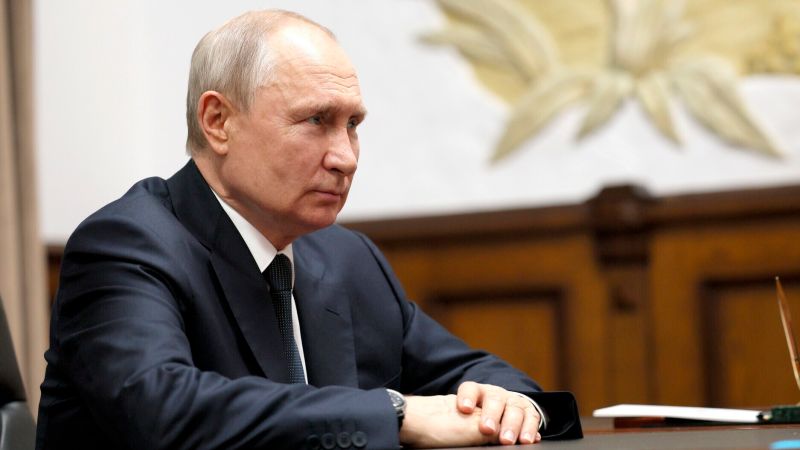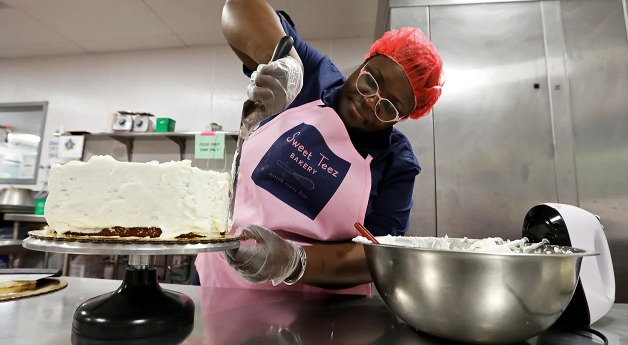Russian President Vladimir Putin’s decision to suspend a deal allowing the export of Ukrainian grain has far-reaching consequences that could impact food shortages in Africa and cause prices to skyrocket in developed countries. This move not only poses a political risk for President Joe Biden as he enters his reelection campaign, but it also highlights Putin’s ability to inflict pain beyond Ukraine.
The Black Sea grain deal, brokered by Turkey and the United Nations, was a rare diplomatic success amidst the shattered relations between Russia and the US. However, by refusing to renew the deal, Putin is once again seeking to impose a cost on the West in retaliation for the sanctions on the Russian economy. He may believe that a food inflation crisis could weaken political support for Ukraine in NATO nations and increase pressure for a negotiated end to the war.
The United States and other Western powers have expressed outrage at Russia’s decision, with Secretary of State Antony Blinken condemning the use of food as a weapon in the war on Ukraine. While singling out Russia as a moral transgressor may rally fury in the West and the developing world, it is unlikely to sway Putin, who is accused of presiding over brutal war crimes.
Despite Russia’s claims that the deal has been terminated, there are indications that it may not be completely over. Russia’s justification for canceling the agreement suggests that there may be room for negotiation, and UN Secretary General António Guterres has made efforts to keep the grain deal alive. However, his proposals have been ignored by Putin, leaving the future of the agreement uncertain.
In conclusion, Putin’s suspension of the grain deal has significant implications for global food supplies and political dynamics. It highlights his willingness to use economic tactics to exert pressure on the West and underscores the challenges of finding a resolution to the ongoing conflict in Ukraine. The repercussions of this decision will be felt far beyond the borders of Russia and Ukraine.Russia’s decision to refuse to renew the Black Sea grain deal has raised eyebrows and sparked speculation about its motives. The move comes at a time when tensions between Russia and Ukraine are high, following the recent NATO summit where G7 nations pledged support for Ukraine’s self-defense. But there may be more to this story than meets the eye.
A complex geopolitical backdrop
The UN chief’s comments suggest that Russia sees a point of leverage in withholding the grain deal. This decision adds another layer of complexity to the already intricate geopolitical landscape. It also sets the stage for a potentially significant meeting between Russian President Putin and Turkish President Erdogan in August.
A shady double game
Some experts believe that the cancellation of the grain deal is part of a larger game being played by Putin and Erdogan. Both leaders have been known to engage in Machiavellian tactics to further their own interests. Erdogan brokered the original grain deal, earning him prestige and gratitude from NATO leaders and developing nations. However, recent actions by Erdogan, such as sending captured Ukrainian military commanders back to Zelensky against a previous agreement, have angered Russia. This cancellation could be Putin’s way of sending a message to his Turkish partner.
The importance of Turkey’s role
Turkey occupies a unique position in this geopolitical chessboard. It has leverage within NATO but also maintains robust relationships with both Ukraine and Russia. Michael Kimmage, a former State Department official, argues that Turkey’s position could lead to a resumption of the grain deal before the Putin-Erdogan meeting. This would not only keep Russia in the good graces of the international community but also demonstrate Turkey’s support for Russia.
Implications for the rest of the world
Reviving the grain deal would not only benefit Russia but also have broader implications. It would show that Russia, despite its isolation, still has some support from Turkey. On the other hand, the cancellation of the deal serves as a reminder to the rest of the world that Russia can be a formidable adversary when it wants to be.
In conclusion, the refusal to renew the Black Sea grain deal by Russia raises questions about its motives and highlights the complex dynamics at play in the region. The upcoming meeting between Putin and Erdogan could shed more light on the situation. As the world watches, the outcome of this geopolitical chess game will have far-reaching consequences.First Video of Damage to Crimean Bridge Surfaces After Reported Strike
Russia’s Actions in Ukraine Could Lead to Widespread Food Shortages
While the war in Ukraine has dominated Russia’s foreign policy, it has also been actively seeking influence in Africa and other regions as a counter to the United States. However, these efforts may backfire as Russia risks triggering food shortages, particularly since a significant portion of Ukraine’s grain is used in World Food Programs to combat famine in Africa. This could have severe consequences for both Russia’s priorities and the global food supply.
White House Response to Russia’s Move
The White House has expressed moral outrage over Russia’s actions, but it has dismissed the idea of attempting to break a Russian blockade in the Black Sea. John Kirby, the coordinator for strategic communications at the National Security Council, stated that this option is not actively being pursued. This aligns with President Biden’s goal of avoiding a direct clash with Russia, a nuclear superpower, through NATO.
The Potential Impact of the Grain Deal Collapse
While the termination of the grain deal would cause significant global hardship, the worst effects may not be immediate. There is still time for diplomacy to work and find a resolution. Nicolay Gorbachov, the President of the Ukrainian Grain Association, believes that exports by road, rail, and river could mitigate the damage for a few weeks, even though they may not match the volume of shipborne cargoes.
The Threat of Food Inflation
Gorbachov also warned that if Ukraine cannot export its grain, it will lead to food inflation worldwide. This would affect both developed and developing countries. He emphasized the need for the international community to find a way to move grain from Ukraine to the global market to prevent this outcome.
Conclusion
The situation between Russia and Ukraine not only has immediate consequences for the region but also has the potential to impact global food security. The first video of the damage to the Crimean bridge serves as a visual reminder of the escalating tensions. As the world watches, the outcome of this conflict will determine not only the fate of Ukraine but also the stability of the global food supply.
Unveiling Putin’s Calculated Move: Is Ukraine’s Grain Deal Making a Comeback?
In recent years, Ukraine has emerged as a major player in the global grain market, with its agricultural sector experiencing significant growth and attracting international attention. However, the country’s grain industry has faced numerous challenges, including political instability, economic turmoil, and trade disputes. Amidst this backdrop, a recent development has caught the attention of analysts and industry experts: the possibility of Ukraine’s grain deal making a comeback, thanks to a calculated move by Russian President Vladimir Putin.
Ukraine, known as the “breadbasket of Europe,” has long been a key exporter of grains such as wheat, corn, and barley. Its fertile soil, favorable climate, and skilled workforce have allowed the country to establish itself as a major supplier to global markets. However, the ongoing conflict with Russia, which began in 2014, has severely impacted Ukraine’s agricultural sector. The annexation of Crimea and the ongoing conflict in the Donbass region have disrupted supply chains, damaged infrastructure, and led to a decline in agricultural production.
In this context, Putin’s calculated move to revive Ukraine’s grain deal comes as a surprise to many. The Russian President has long been accused of using economic leverage to exert influence over neighboring countries, and Ukraine has been a prime target of his tactics. By imposing trade restrictions, embargoes, and import bans, Putin has sought to weaken Ukraine’s economy and assert control over its agricultural sector.
However, recent developments suggest a change in Putin’s approach. In December 2020, Russia lifted its ban on grain exports, which had been in place since April of the same year. This move was seen as a significant step towards normalizing trade relations between the two countries. Furthermore, in January 2021, Russia announced its intention to resume imports of Ukrainian grain, signaling a potential revival of the once-thriving grain deal.
The motivations behind Putin’s calculated move are multifaceted. Firstly, Russia’s decision to lift the grain export ban can be attributed to its own economic interests. The country’s agricultural sector has faced challenges of its own, including adverse weather conditions and a decline in production. By resuming grain imports from Ukraine, Russia can ensure a stable supply of grains to meet domestic demand and stabilize prices.
Secondly, Putin’s move can be seen as a strategic maneuver to exert influence over Ukraine. By reviving the grain deal, Russia can strengthen economic ties with its neighbor and potentially gain leverage in future negotiations. This move comes at a time when Ukraine is seeking to diversify its export markets and reduce its dependence on Russia. By offering favorable trade terms, Russia can entice Ukraine to reconsider its stance and potentially align its economic policies more closely with Moscow’s interests.
However, it is important to approach this development with caution. While the resumption of the grain deal may seem promising, there are still significant challenges that need to be addressed. The ongoing conflict in eastern Ukraine, as well as political tensions between the two countries, continue to cast a shadow over the prospects of a sustainable trade relationship. Additionally, Ukraine’s efforts to diversify its export markets and establish stronger ties with the European Union may hinder its willingness to fully embrace the revived grain deal.
In conclusion, Putin’s calculated move to revive Ukraine’s grain deal raises intriguing questions about the future of the country’s agricultural sector. While the resumption of trade between the two countries holds potential benefits for both parties, it is crucial to consider the broader geopolitical context and the challenges that lie ahead. Only time will tell whether this move will mark a true comeback for Ukraine’s grain industry or simply be another chapter in the complex relationship between the two neighboring nations.









